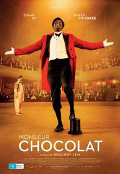
Directed by
Roschdy Zem
119 minutes
Rated PG
Reviewed by
Bernard Hemingway

Monsieur Chocolat
Synopsis: The rise and fall of Chocolat (Omar Sy), a black circus performer and music hall clown who conquered late 19th century Paris with his exoticism.
Based on the trailer for this film I wasn’t expecting a lot of Monsieur Chocolat, more style than substance was my prediction, but I was surprised to find a poignant story of the joys and sorrows of fleeting fame and fortune set convincingly in a fascinating period of French history
Set at a time when Paris was not only the artistic hub of the Western world but mistress of a colonial empire the film tells the story of an uneducated former Afro-Cuban slave, Rafael Padilla, who is rescued from the ignominy of exhibiting himself as a “Nigger King” in a flea-bitten French provincial circus by an ambitious professional clown known as Footit (James Thierrée), the two eventually becoming the toast of Paris.
Whilst the core biographical details are handled with top drawer production values, both in depicting the ratty setting of Chocolat’s low-rent beginnings and the lavish lifestyle of his latter-day triumph in Belle Époque Paris, what gives the film its substance are the twinned themes of the clash of artistic egos as both Footit and Chocolat see themselves as the source of their duo’s success, and the endemic racism which Chocolat initially colludes with and that ironically carries him to success but which he eventually turns against. These combined forces see Chocolat lifted out of his station but also ultimately destroy him.
As Chocolat, Omar Sy gives an affecting performance, capturing the man extraordinarily blessed by good fortune but also given to self-destructive behaviour. James Thierrée , a real-life circus-performer who looks remarkably like Charles Chaplin, which is not surprising as he is a grandson to the world's most famous clown) is capable as Chocolat’s more realistic partner although I couldn’t help but think that Dominique Pinon, best known for Delicatessen (1991), would have given the film and the performances in particular a much-needed lift. For as much as pratfalls and slapstick may have entertained late 19th century audiences they don’t have that effect here. The film ends with a brief 1896 film of the real Footit and Chocolat performing a routine, one which is recreated during the story, but the antique technology gives the original a quaint charm that is missing from Zem’s rather glossily modern re-creation. In addition, an end title tells us that the two men revolutionized their profession although this idea is never really developed.
Even so, Monsieur Chocolat is a quality costume drama with a substantial story.

Want more about this film?


Want something different?




